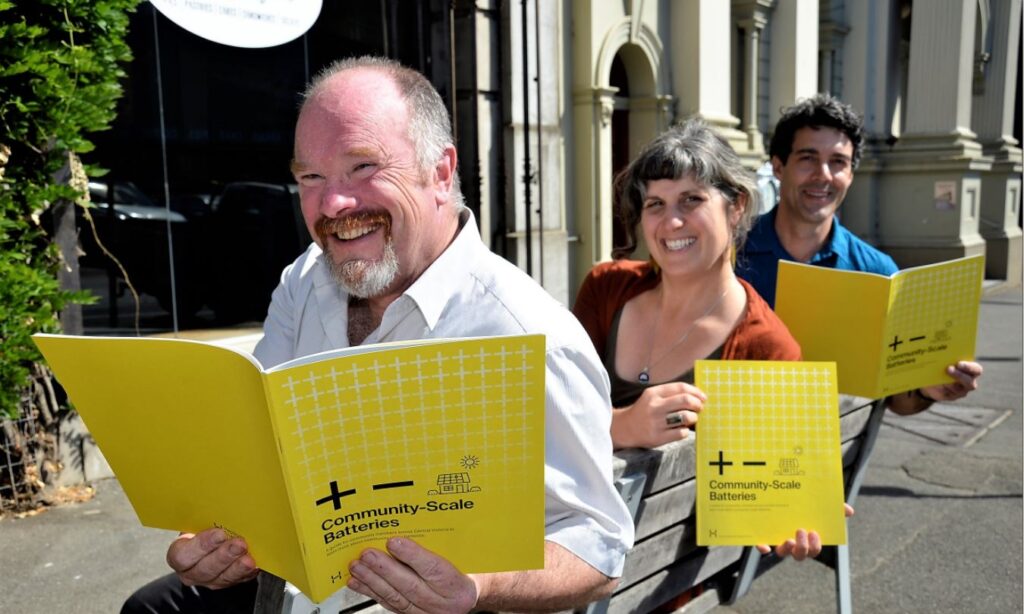March 17th, 2023Community batteries…the potentials and pitfalls
COMMUNITY groups keen to get their own community battery, fed by clean renewable energy, up
and going need to make sure they know their stuff first.
That’s the main message as Hepburn Energy releases a new booklet that carefully examines
the potential of community-scale batteries across Central Victoria – and offers clarity on their
opportunities and constraints.
“The community needs to be really cautious about the type of community scale battery they go for,” says key author Marie Lakey.
The booklet’s publication follows a Central Victorian Greenhouse Alliance-led project called Community Sparks, funded under the state’s Neighbourhood Battery Initiative, assessing potential of community-scale batteries across the region.

Hepburn Energy and Hepburn Shire Council were key partners on the project.
Drawing on technical analysis from independent consultants, Orkestra, legal research from the University of Melbourne and a social feasibility study from Hepburn Energy, the booklet offers in-depth information about community-scale batteries.
“Our social feasibility study highlighted that community members are interested
in community-scale batteries. With terrible grid reliability in many parts of Central
Victoria, lots of residents are being proactive and looking for a solution,” Hepburn
Energy general manager Taryn Lane says.
Community batteries are proposed as a tool to address this issue. Advocates
suggest they can improve reliability, enable more solar, cut greenhouse gas emissions
and help households save on bills.
But the team at Hepburn Energy have found a more complicated picture.
“When we received technical reports back from Orkestra, we were stunned,” Ms Lane said.
“The conventional battery that many people are advocating for (one located on
the street level, at an electricity transformer) doesn’t seem remotely viable.
“They’re just too expensive, so community members would face an ongoing cost,
rather than saving, and there is a risk of stranded assets with that model.”
The booklet offers clear cautions about some models of community-scale batteries
but other opportunities are presented.
“There’s lots of potential for behind-the-meter batteries. These can be located at
community facilities, or even at an industrial facility, but in a way that offers benefits
back to the community,” Ms Lane says.
The Central Victorian Greenhouse Alliance’s Dr David Gormley-O’Brien agrees
and highlights opportunities for community groups to install behind-the-meter
batteries on key infrastructure like community hubs.
“Installing behind-the-meter batteries on key buildings, using lots of solar on
the building, represents a real opportunity to help in emergency situations such as
bushfires or major wind events to enable emergency power supply,” Dr Gormley- O’Brien says.
“And if the battery is large enough we can get a surplus and participate in the
energy market.
“For a 300-kilowatt battery you are looking at something around $400,000 but we’re expecting prices to come down.”
Backup power systems are a “no-brainer”, Ms Lane says.
“Particularly for regional areas such as our shire, and another viable model is
batteries co-located at a community generator, such as what we’re proposing at
Hepburn Energy.”
The report examines these different models in detail, offering guidance on relevant regulations and case studies of existing community-scale batteries.
“We hope this booklet can answer lots of the questions we’ve been receiving about this technology,” Ms Lane said.
More information and downloadable copies of the report are available through Hepburn Energy.
Release of the report examining the community battery pros and cons comes as Hepburn Energy also facilitates a second heat pump hot water bulk buy from March 16.
Government rebates now mean premium heat pump hot water systems are cheaper than ever before, with bulk-buy participants able to save on a new hot water heater.
After the success of the 2021 round 1 sold-out heat pump bulk buy, Hepburn
Energy is now extending their round 2 bulk buy beyond the Hepburn Shire to
include neighbouring areas.
Hepburn Energy and installation partner t2zero will be running two webinars to
demystify the technology, explain the bulk buy process and give community members
an opportunity to ask questions.
Business executive with t2zero, Jürgen Rhyon says the benefits of heat pump
technology are clear as storage water heaters account for a substantial component of
household electricity consumption.
“Imagine being able to reduce this component of consumption by 80 per cent,” Mr Rhyon says.
“The Victorian Energy Efficiency Certificate rebate is at levels never seen before, making this a perfect time to transition to this technology.”
Those keen to find out more can join the Heat Pump Hot Water Bulk Buy webinar on Monday, April 3 from 6.15pm to 7.15pm.
Words & images: Eve Lamb










